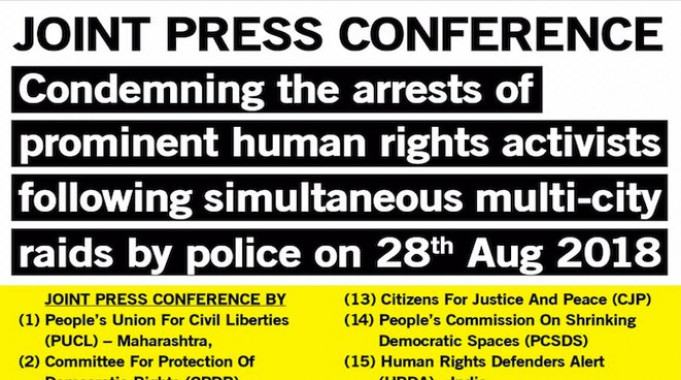The “Urban Naxal” press conference
The contrast couldn’t have been starker.
While Republic TV and Times Now were going gaga over the nationwide raids on and arrests of activists and lawyers; a completely different spectacle was observed at a media interaction held by defenders of the activists in Mumbai. While the defenders defended, the media was surprisingly docile.
On Tuesday, Republic proudly linked the raids on the homes of human rights activists and lawyers across the country, and the arrests of five of them, to the channel’s ``hard work’’, its ``exposes’’ of two letters in June and July. The first letter it alleged, had talked about a plot to assassinate the PM and the second, had contained a request for foreign funds. Arnab Goswami called the five ``urban Naxals’’, compared them to Osama bin Laden, spoke of a link between ``Maoists, Kashmir, the arms lobby’’, all this with the headline #India Vs Maoists. ``India is relieved,’’ he declared, that these people had been arrested.
``Fake activists and fake intellectuals’’, the ``human rights club’’, had ``ganged up’’ to support these Urban Naxals, said Goswami. These Urban Naxals carried ``jholas and travelled club class’’ and they supported Maoists who were no different from terrorists such as the Jaish e Mohammed, the Islamic state, HUJI. ``We are taking them on, you should too,’’ Goswami told his viewers.
On Wednesday, after the Supreme Court denied the police custody of the five arrested activists, and said they must be placed under house arrest till its next hearing in the matter, Times Now ran a headline ``interim setback in the SC’’. On its screen, were juxtaposed advocate Prashant Bhushan speaking outside the SC and a press briefing by the Pune police, except that Bhushan was kept on mute, while the police briefing was relayed in full.
The contrast between what was shown on these two channels, and what took place at another media gathering couldn’t have been greater. On Wednesday afternoon, the Mumbai Press Club hall was packed, not just with the media, but with all kinds of people, from workers to students to academicians, many of them members of the organisations that were together hosting a press conference in defence of those arrested. Thirty seven organisations got to geher to hold the press conference.
Present on the dais were two individuals whose homes had been raided: Dr Anand Teltumde, whose home in the campus of the Goa Institute of Management had been raided in his absence; and lawyer and ex-journalist Susan Abraham, whose husband Vernon Gonsalves was one of those arrested.
Teltumde introduced himself through his qualifications: a mechanical engineer; an IIM Ahmedabad graduate; a PhD in cybernetics, one of the few such Phds in Asia; former executive director of Bharat Petroleum; former MD of Petronet India Ltd; former lecturer in Business Management at IIT Kharagpur; and for the last two years, senior professor and chair, Big Data Analytics, at the Goa Institute of Management. ``This is the face of the Urban Naxal,’’ he ended bitterly, adding: ``What will my students, who are studying business management and will be the corporate leaders of tomorrow, think about me now?”
The police he said, had taken away the mobiles of the security men and forced one of them to hand over the key to his apartment.
Describing the raid on her home that began at 6 am and continued till 1.45pm, Susan Abraham narrated a telling exchange between her and the policemen. ``You have spent more than six hours raiding my home,’’ she told them. ``Have you spent even six minutes raiding the homes of the two individuals who were accused of instigating violence at Bhima Koreagon: Milind Ekbote and Sambhaji Bhide?”
``If the orders come from the top, we shall raid their homes,’’ the cops replied.
Among the others who addressed the media were senior lawyer Mihir Desai and former Justice Kolse Patil, one of the two organisers of the Elgaar Parishad in Pune, which was held on December 31, 2017, a day before the Bhima Koregaon rally. The police have alleged that the Parishad was funded by Maoists. Justice Kolse Patil challenged them to prove that either he, or his co-organiser, former SC judge P B Sawant, had taken any money from anyone for organising the Elgaar Parishad.
Interestingly, the press conference was punctuated by applause at some of the assertions made by the speakers, specially the ``breaking news’’ that came in from the Supreme Court while the conference was in session.
The questions that followed were few; and only two of them expressed some doubts about those arrested. The first was in the form of a comment: ``You know these arrested persons as human rights defenders. But surely the government and its agencies must be having something concrete against these persons, that’s why they have been arrested.’’
The second simply asked: ``Why don’t you trust the law?”
Was the entire media present there sympathetic to the activists, like Arnab’s ``fake intellectuals’’? That would be unusual; the media has not generally been supportive of anything to do with Maoists.
Or were the journalists hesitant to be more aggressive given the mood of the audience? However unusual, that does seem to have been the case. Some journalists present there wondered why the same scepticism towards the police version was not being shown when it came to the Hindutva activists arrested in Maharashtra and alleged to be members of the Sanatan Sanstha. But none of them formulated this into a question.
Jyoti Punwani is an independent journalist based in Mumbai







